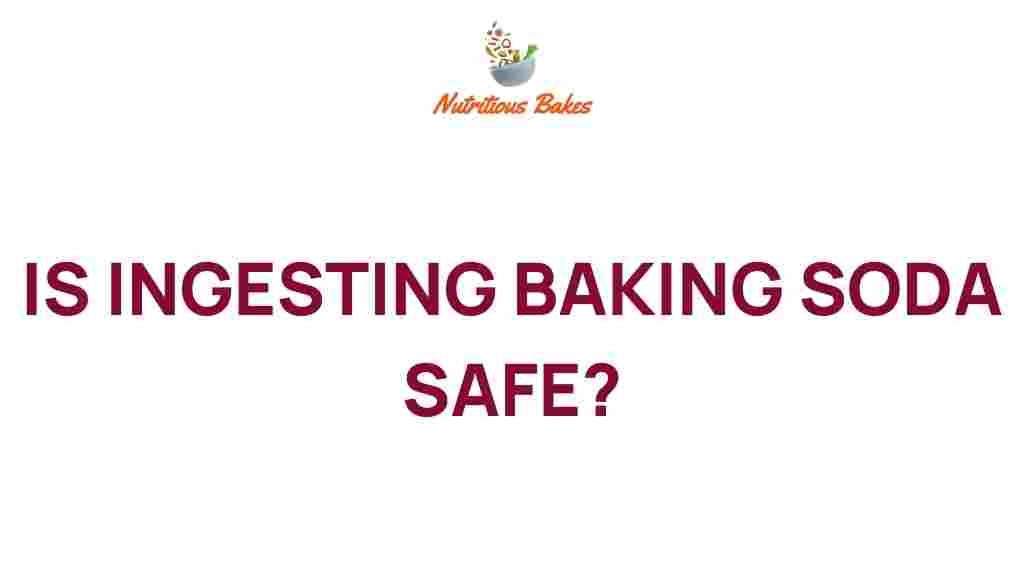Is Ingesting Baking Soda Safe? Unveiling the Truth Behind This Kitchen Staple
Baking soda, scientifically known as sodium bicarbonate, is a versatile kitchen staple that has been used for centuries. While most people associate baking soda primarily with baking, its applications extend far beyond the kitchen. From household cleaning to health remedies, baking soda boasts numerous benefits. However, many are left wondering: is ingesting baking soda safe? In this article, we will explore the safety, health benefits, appropriate dosage, potential side effects, and the natural remedies associated with baking soda, especially in relation to digestion and alkalinity.
Understanding Baking Soda
Baking soda is a white crystalline powder that acts as a leavening agent in baking. When combined with an acid, it produces carbon dioxide, which helps dough rise. But its use isn’t limited to baking; baking soda is also known for its ability to neutralize acids, making it a popular choice for various remedies and cleaning tasks.
Safety of Ingesting Baking Soda
When used correctly, baking soda is generally considered safe for ingestion. However, it’s important to understand the proper usage and individual circumstances before incorporating it into your diet.
- Dosage: The recommended dosage for adults is typically 1/2 teaspoon dissolved in a glass of water, taken no more than once every 2 hours. It’s crucial to not exceed 7 teaspoons within 24 hours.
- Individual Health Conditions: Individuals with certain health conditions, particularly those related to the kidneys, high blood pressure, or heart problems, should consult a healthcare professional before using baking soda as a remedy.
- Pregnant and Nursing Women: It’s advisable for pregnant or nursing women to avoid ingesting baking soda unless directed by a healthcare provider.
Health Benefits of Baking Soda
Baking soda offers numerous health benefits, particularly in relation to digestion and maintaining the body’s alkalinity. Here are some notable advantages:
- Digestive Aid: Baking soda can help alleviate symptoms of acid reflux and indigestion by neutralizing stomach acid.
- Natural Antacid: It acts as a natural antacid, providing relief from heartburn and upset stomach.
- Alkalinity: Consuming baking soda can help increase the body’s alkalinity, which is believed to support overall health and well-being.
- Detoxification: Some proponents suggest that baking soda can aid in detoxifying the body by neutralizing acidic waste products.
How to Use Baking Soda Safely
Incorporating baking soda into your routine can be beneficial if done correctly. Here’s a step-by-step guide:
- Start Small: Begin with a low dosage, such as 1/4 teaspoon mixed with water, to assess your body’s reaction.
- Dissolve Properly: Always dissolve baking soda in water before ingesting to prevent any potential irritation to the stomach lining.
- Monitor Symptoms: Keep track of how your body responds. If you experience any discomfort, stop using it immediately.
- Consult a Professional: If you have existing health conditions or are on medication, consult with a healthcare provider before using baking soda as a remedy.
Potential Side Effects of Ingesting Baking Soda
While many people can safely consume baking soda, it’s essential to be aware of potential side effects:
- Gas and Bloating: Ingesting baking soda can lead to gas buildup, causing bloating and discomfort.
- High Sodium Levels: Excessive consumption can lead to high sodium levels in the body, which can be dangerous, especially for individuals with certain health issues.
- Stomach Irritation: Some people may experience irritation or discomfort in the stomach lining if baking soda is not properly diluted.
- Alkalosis: Overuse may result in metabolic alkalosis, a condition characterized by an overly alkaline state in the body, leading to muscle twitching, hand tremors, and nausea.
Natural Remedies with Baking Soda
Baking soda is often used in various natural remedies. Here are some popular uses:
- Heartburn Relief: Mix 1/2 teaspoon of baking soda in a glass of water and drink it to relieve heartburn symptoms.
- Oral Health: A paste made from baking soda and water can help whiten teeth and freshen breath.
- Foot Soak: Soaking your feet in warm water with baking soda can help soothe tired feet and combat foot odor.
Tips for Troubleshooting Common Issues
While using baking soda, you may encounter some common issues. Here are tips for troubleshooting:
- Excessive Gas: If you experience gas or bloating, reduce the dosage or frequency of use.
- Unpleasant Taste: Mixing baking soda with flavored liquids like lemon juice or herbal tea can help mask its taste.
- Stomach Discomfort: Always ensure baking soda is well-dissolved in water to minimize irritation.
Conclusion
Ingesting baking soda can be safe and beneficial for many individuals when done correctly. With its numerous health benefits, particularly related to digestion and alkalinity, baking soda is a valuable addition to your kitchen and health toolkit. However, it is vital to adhere to recommended dosages and consult with a healthcare professional if you have any underlying health conditions.
As with any remedy, moderation is key. By understanding both the benefits and potential risks, you can make informed decisions about using baking soda safely. If you’re interested in exploring more natural remedies, check out this informative article on natural health solutions.
For further reading on baking soda and its uses, visit this resource.
This article is in the category Tips and created by NutritiousBakes Team
